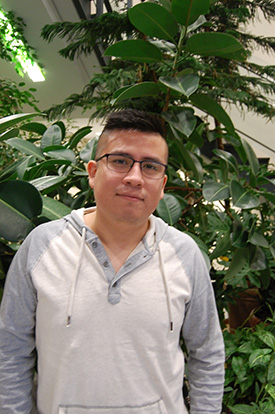 Gerardo Reyes came to Brown through the Leadership Alliance Summer Research Early Identification Program and continued through the Post-baccalaureate Research Education Program (PREP) before beginning his doctoral program last fall.
Gerardo Reyes came to Brown through the Leadership Alliance Summer Research Early Identification Program and continued through the Post-baccalaureate Research Education Program (PREP) before beginning his doctoral program last fall.
Reyes first learned about the Leadership Alliance program from an undergraduate mentor and felt it was a great opportunity to continue his education. “It’s where I fell in love with science,” and his passion for research began.
“The Leadership Alliance not only gave me an opportunity to learn about research but also to learn about the importance of diversity, inclusion, mentorship, and networking in science. It was also how I got in touch with the professors and faculty who helped me later apply for PREP,” says Reyes.
The PREP program was a yearlong intensive research training that allowed me to become more familiar with research, develop laboratory techniques, and be more independent. I connected with many PhD students and it helped me better understand what it means to be one. In addition, the PREP program allowed me to build connection with peers, faculty, and professors that were crucial in supporting me when applying to graduate programs.”
He credits his mentors for helping him succeed thus far. “As a first-generation student, I have experienced challenges in navigating the academy. I know that if it wasn’t for my mentors, I would not have been able to finish my undergraduate degree,” says Reyes.
“The faculty and staff at Brown are friendly, willing to help and teach you. I have found a community that understands me and supports me and that is important for my personal and professional growth as a future scientist and mentor,” says Reyes.
Reyes is enthusiastic about his first year as a PhD student. He’s finding a balance between lab experiments, classes, and schoolwork and says one of the things he’s enjoyed most is the opportunity to explore new research areas, establish connections, and make lifelong friends.
Reyes has already been exposed to a variety of research projects during his time at Brown from embryonic development to plant fertilization.
His initial research involved characterizing the vitellogenin and MYP proteins, which are important for early embryo development in sea stars and sea urchins. He also experimented with phthalates, a material used in the production of plastics, and retinoic acid to examine the adverse effect that they can have on development of the fetal rat testis.
During his first lab rotation as a PhD student, Reyes studied the fast block to polyspermy in the plant, Arabidopsis thaliana. This important process helps to prevent failure to fertilization in sexually reproducing organisms.
Reyes was excited by this project, “for plants, the success of fertilization results in the fruits that we eat. The mechanism itself is not fully understood and defining it would be beneficial to many areas of research such as developmental biology and agriculture.” This semester he’ll examine the structure of CXCL12, a protein which functions in the human immune response and has been implicated in cancer.
Looking ahead Reyes talks about wanting to give back to his community through mentorship.
“I want to be able to help students going through school or in a research environment. I see graduate school as a training phase. I am here to learn how to do research in science, to learn how to mentor students, and to obtain the necessary tools that I will use for my future career,” he says.
Reyes is originally from Lima, Peru and completed his associate’s degree at LaGuardia Community College (CUNY) and finished his bachelor’s degree at the College of Mount Saint Vincent.